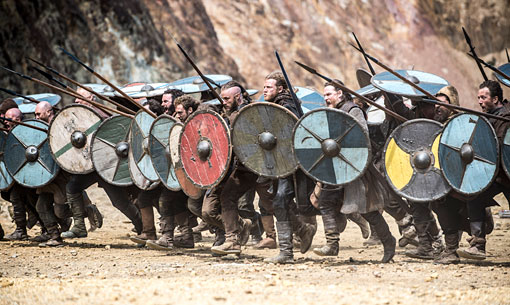
On the History Channel series Vikings, Ragnar’s army charges into battle. Photo by Bernard Walsh/HISTORY. Copyright 2014
Have you ever watched a movie or a television show with someone who nitpicks tiny little things? You know, the guy who bitterly complains that a car parked halfway down the street wasn’t in production until 1956 even though the show is set in 1955? We all know that guy. We all hate that guy. And occasionally, we all are that guy. Today I’m going to be that guy.
 I’ve finally watched the first season of History’s Vikings, written by Michael Hirst. From time to time, friends who know that I studied Old Norse and that I enjoy all things Viking have asked me if I’d seen it, but I was wary because I knew it would annoy me. This is the History Channel after all, the people who gave us Ancient Aliens. Despite my wariness, I did try to watch it a few months ago. It annoyed me. The shifting accents—sometimes thick, sometimes barely existent—annoyed me. The stupidest hairstyles in the history of hair annoyed me. And, above all, the constant smirking of protagonist Ragnar Smirky-Breeches annoyed me. Okay, it’s actually Ragnar Lothbrok (Loðbrók) or “Hairy-Breeches,” but his breeches aren’t hairy, and he does smirk. A lot.
I’ve finally watched the first season of History’s Vikings, written by Michael Hirst. From time to time, friends who know that I studied Old Norse and that I enjoy all things Viking have asked me if I’d seen it, but I was wary because I knew it would annoy me. This is the History Channel after all, the people who gave us Ancient Aliens. Despite my wariness, I did try to watch it a few months ago. It annoyed me. The shifting accents—sometimes thick, sometimes barely existent—annoyed me. The stupidest hairstyles in the history of hair annoyed me. And, above all, the constant smirking of protagonist Ragnar Smirky-Breeches annoyed me. Okay, it’s actually Ragnar Lothbrok (Loðbrók) or “Hairy-Breeches,” but his breeches aren’t hairy, and he does smirk. A lot.
So I gave up for a bit, but recently I tried again, and I have really tried to appreciate it. I do appreciate that Hirst seems to have used some recognizable medieval sources, such as Saxo Grammaticus’s Gesta Danorum (for many of the characters); Ibn Fadlan’s account of the Rus (for the Vikings’ disgusting washing ritual in episode 2 and for Earl Haraldson’s ship funeral. Both scenes will be familiar to anyone who’s seen The 13th Warrior); and Adam of Bremen’s third-hand account of the pagan temple at Uppsala. I also enjoy hearing occasional snippets of Old Norse and Old English.
In addition, I fully realize that the series is fiction. It isn’t pretending to be a documentary, and no one is claiming that it is historically accurate in all aspects. I’m willing to accept a certain amount of creative license, even if it hurts me just a tiny bit. So I’m willing to accept that the presumably Danish Ragnar (c. late 8th–early 9th century—if he existed) and the possibly Norwegian Rollo, founder of the Norman dynasty (c. 9th–10th century), were brothers; that they sailed to Lindisfarne in the Norwegian Oseberg ship (c. 820).
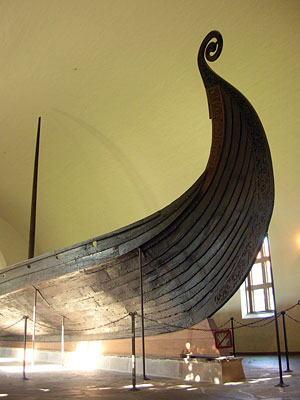
“Exhibition in Viking Ship Museum, Oslo 01” by Grzegorz Wysocki – Own work. Licensed under Creative Commons Attribution 3.0 via Wikimedia Commons
I’m willing to accept that they raided Lindisfarne Priory (793); that immediately before the raid, the monk Athelstan was working on folio 5v of the Lindisfarne Gospels (London, BL MS Cotton Nero D IV, c. 700); and that during the raid, the Vikings killed St. Cuthbert (who died of natural causes in 687 at his hermitage on Little Farne Island; his reputation for holiness and his “miraculously” preserved body were to a large extent responsible for Lindisfarne’s wealth).
I can accept all that geographical, temporal, and historical weirdness. Well, it makes me sad that the fictional Lindisfarne Gospels was never finished and that the bits that had been completed were presumably destroyed when the preternaturally irritating ship builder/lunatic Floki used parchment from the scriptorium to start a fire, but I remind myself that the real Lindisfarne Gospels are complete and in good condition.
But other things in the show drive me crazy. I don’t have a problem with Anglicized or Latinized names, especially since some of the characters come from the Gesta Danorum, which was written in Latin. Some of the names, though, just don’t make any sense. Gabriel Byrne’s character is called Earl Haraldson. I don’t mind that they spelled “Haraldson” with one “s,” (leaving out the genitive/possessive “s”), and I don’t mind that they used the English title “earl” rather than the Norse “jarl”—the English form is more familiar to most people. At least I didn’t mind it until they introduced the character of Jarl Borg. The only difference between “earl” and “jarl” is the language of origin. Why on earth are both jarls and earls gallivanting around Scandinavia? It’s nonsensical. And why doesn’t Earl Haraldson have a real name? “Haraldson” is a patronymic. His father’s name was presumably “Harald.” Iceland still uses patronymics. The Icelandic phone book is arranged alphabetically by first name, and Icelandic authors are cataloged by first name in the Library of Congress system. No one would have just a patronymic. Maybe the earl wouldn’t have been such an evil grumpy-boots if someone had given him a first name.
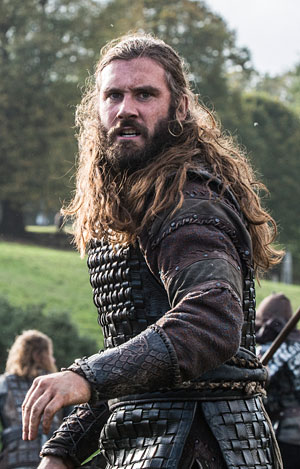
“Rollo,” played by Clive Standen, mid battle. Photo by Jonathan Hession/HISTORY. Copyright 2014
I also found Rollo’s name troubling. Not initially. “Rollo” is Latinized, but that is how the founder of the Norman dynasty is commonly known outside of Scandinavia; however, in episode 7, Rollo agrees to let the Anglo-Saxons baptize him. They give him the “Christian” name Hrolf (they may not pronounce the “h,” but it’s the same name). First of all, Hrolf is not a Christian name. Secondly, as should be clear from the names of the various monks and priests in Vikings (Athelstan and Cuthbert, for instance), the Anglo-Saxons did not typically take specifically Christian names, like Peter or Paul; they continued to use traditional Anglo-Saxon names. Most importantly, Hrolf (Hrólfr) is a Norse name. Why in the world would Anglo-Saxon Christians give a pagan Norseman a pagan Norse name as a baptismal name? It would be like a German arriving at Ellis Island and saying his name is “Miller,” and being told, “Well, we’re going to give you the American name ‘Müller.'” The Old English equivalent of “Hrolf” is “Hroðulf.” Both mean “famous wolf,” which, as I said, doesn’t exactly scream “Hey, look at me! I’m a Christian!” In Beowulf, the nephew of the Danish king Hroðgar (famous spear) is named Hroðulf. In Norse sources, he is known as Hrólfr Kraki (Hrolf Pole-ladder). In Norse, Rollo is called Göngu-Hrólfr, Hrolf the Walker.
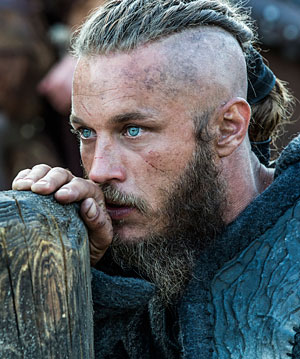
“Ragnar,” portrayed by Travis Fimmel. Photo by Bernard Walsh/HISTORY. Copyright 2014
These are comparatively minor quibbles, however. What bothers me most is the main theme of the first few episodes: Ragnar’s determination to sail west. The earl insists that his men raid in the east, as they have every previous year. When Ragnar suggests sailing west, he is met with skepticism, disdain, and mockery. Rollo tells Ragnar, “You can’t sail across an open ocean.” Hearing later that Ragnar has sailed, the earl declares, “There are no lands to the west!” When a storm hits the ship during the voyage, one of the crew members says, “There is no west. We are not sailing towards any new country but just into an empty ocean.” He gets so annoying about it that Ragnar stabs him in the neck. Even Ragnar has his doubts though. When his shield-maiden wife becomes angry that she is not accompanying him, he asks, “What if there is no west?”
And where out west are they heading? North America perhaps? Nope. Ragnar tells his potential crewmen that “we’ve got a new boat, and with this boat for the first time [dramatic pause] we can go west across the Great Sea to a place called ‘England.'”
England. ENGLAND!!! Stop acting as if you’re sailing to frigging Atlantis! It’s England. Everyone knows it’s there! A good portion of western Europe’s invaded it already!
Pardon the rant, but the Vikings discuss England as if it were some mythical land only whispered about in campfire stories. In reality, many, many people had gotten to England before the Vikings (and Lindisfarne wasn’t the first Viking raid anyway), and they’d gotten there by sailing over the sea. How the crap does Hirst think the English got to England? Did they walk? Jump? How about the Romans? The Celts? The Christian missionaries? Granted, some of these settlers crossed the English Channel, not the North Sea, but the Anglo-Saxon homelands are not too terribly far from Ragnar’s home. Hell, when the Vikings encounter Athelstan, he says something in Norse. Ragnar asks (in modern English), “How do you speak our language?” The answer is that he’s traveled. To Scandinavia. From England. Over the open sea (presumably). These Vikings, these bold seafarers, are less-well traveled than an English monk who’s afraid of thunderstorms!
Hirst seems to be harking back to comparatively modern stories about Columbus, fictional stories in which Columbus was told he couldn’t sail west because the earth was flat, and he would fall off the edge if he tried to sail much beyond Ireland. No one tells Ragnar that the world is flat (although the Norse did think of it as a flat disk) and that he’d fall off if he sailed west, but the dire warnings seem to recall that trope.
Once they get to England, though, the Vikings are set. Based on the first season of Vikings, an infant with a toothpick could defeat an Anglo-Saxon army, no matter how large or well equipped. When did the Anglo-Saxons forget how to Anglo-Saxon? They converted to Christianity, and all of a sudden, they forgot how weapons work? They lost the instructions that told them how to form a shield wall (Old English bordweall, scyldweall, scyldburh)? The Norse constantly form shield walls in Vikings, but the English never do. In reality, the shield wall was a staple of Anglo-Saxon warfare. In many battles between the Anglo-Saxons and the Norse, both sides used shield walls.
Creative license and minor linguistic flubs are to be expected, but in his depiction of the Vikings and the Anglo-Saxons, Hirst veers into pseudohistory: the Vikings are savage morons who don’t know how the ocean works, don’t believe in England, and have never heard of Christians. Meanwhile, the Anglo-Saxons are effete incompetents who can’t find the pointy end of a spear until they’re impaled on it. It’s as if the two groups are in no way culturally or linguistically similar. It’s hard to imagine the Anglo-Saxons composing or enjoying poems like Beowulf, The Battle of Maldon, or The Battle of Brunanburh (Brunanburh was a glorious victory for the Anglo-Saxons; Maldon a glorious defeat). Of course the Anglo-Saxons viewed the Vikings with horror: they were raiders who looted and killed. Later they became invaders and conquered a significant portion of England. And they were pagan. To Christian Anglo-Saxons, this made them Other, unacceptably foreign. However, the Ango-Saxons and the Norse were culturally and linguistically very close. Germanic ideals of heroism survived the conversion to Christianity and even appears in explicitly Christian poetry. Hirst’s characterization of both the Norse and the Anglo-Saxons is silly, stereotyped pseudohistory.

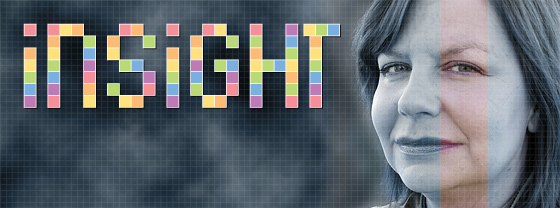









I don’t know what you have against the Vikings – they play pretty good football.
Hey
At least they didn’t have bloody great ox horns sticking out of their helmets.
Why did Vikings have horns ? because their bells didn’t work !
Actually speaking as someone who works in the film and TV costume hire business you would be surprised at some of the stupid requests you get asked for.
I’ve had to hold my nose and think of the money when a production company asks me to provide uniforms and costumes for “Documentaries” like “Hitlers secret Alien powered invisible submarine”.
I worked on a series about Heretics and met the writers of the ‘Holy Blood, Holy Grail’, who were being employed as ‘historical advisers’……nutters.
Very interesting to read this from a person who is an expert in the subject. However, compared to the other programs on the History Channel (Ancient Aliens, The Bible etc), “Vikings” is exceptionally accurate! After all, it is based on people who actually existed (yes, I know, “viking” is a verb and refers to an activity – raiding – not a national group) and on general events that actually occurred.
I haven’t given up on the show. I never watched it because I gave up on the History Channel. As far as I can tell, based on the things I know well, too much of their programming falls into pseudo-history or (at best) unsubstantiated and over-hyped ‘alternate’ theories with little support in the greater historical professions/community.
Per Mr. B, yeah, what do you expect from a channel that ran a show implying LBJ whacked Jack?
Well, this *is* the History Channel. And we all know what it has become.
Great article! Haven’t seen the show, but very funny still. But of course, you invite people to get into nitpicking mode, so I MAY have a nitpick:
What are the best sources for saying the vikings thought earth a disk? In Konungs Skuggsjá, (The king’s mirror, ca 1227) “father” explains with an example of an apple casting shadow that the earth has to be spherical.
http://www.archive.org/stream/kingsmirrorspecu00konuuoft/kingsmirrorspecu00konuuoft_djvu.txt
Snorri’s Kringla Heimsins, “the big cake that is our home”, is translated in english to “orb of the world”, so that would seemingly also support “vikings knew earth was round”, but that boils down to how a “Kringla” is baked. My grandmother made kringle that looked like a big pretzel, but it would be a crappy design for a planet. (Although Stephen Hawking or some other super-clever physicians have proposed a “twisted doughnut-shape to the universe. http://www.nature.com/news/2008/080523/full/news.2008.854.html … ) I haven’t found any good sources on what Snorri meant with “Kringla”, but this is pure laziness on my side.
Also Eirik Raude and Leif Eiriksson would probably not be so eager to sail towards the horizon if they bought into the “flat disk” theory. It’s just that in my research for a viking graphic novel, I found more good sources implying that most vikings believed in a spherical earth than in a flat disk, but my research was pretty random and pleasure-based.
Kringla means a round thing.
You should see the Vikings wiki. People take this as history.
This is brilliant. As someone who reads a lot of history AND historical novels and watches historical TV shows, I often find that I can let the big things like conflating two characters into one, or playing around with timelines pass. What gets me annoyed is when writers portray people in the past as ignorant savages, in the manner of these Vikings who believe England is a mythical land.
When did the entertainment industry care about historical accuracy? Or accuracy of any kind? See any “science” fiction movie or TV show. It still kills me when Spock says ‘galaxy’ when he means ‘universe’ or ‘solar system’ – happened all the time).
It’s a shame that they can’t be bothered to get the simplest things right. How hard is it to hire a good consultant?
But do yourself a giant favor and go back and watch the a950’s Kirk Douglas version of this story (where Earnest Bourgnine played Ragnar Lothbrok) and realize just how m far we’ve come since then.
I think what annoys me is that the Anglo-Saxons beat the Vikings any number of times in battle. You don’t even have to know any history to know that, just read Hereward the Wake or Bernard Cornwell’s novels such as they are. And you don’t need accents. The Brits made a reasonable fist of Hereward the Wake (which is admittedly a 19th-century romanticisation) using just regional British accents. And if I remember rightly, Ben Hur used English accents for the Romans and Americans for the rest. Nobody has to mangle their bloody vowels surely :-).
Thank you, thank you, thank you.
I don’t expect it to be a Historical document, but once the History channel used fact checking where now it uses fact distortion. Though it still uses its reputation as a documentary channel it keeps pumping out nonsense like Ancient Aliens, The Bible and Vikings. It’s lost it influence and has gone for crappy pop-entertainment.
If you haven’t already seen it, the ‘battle’ scene in the first episode of season 2 was the point where I stopped finding the inaccuracies laughable and realised that there was no longer ANY pretense of historical influence.
No, I haven’t seen season 2 yet. That pleasure still awaits me.
The Uppsala episod almost made me scream, it look like Rivendale… I live 70 km from Uppsala and my sister lived there for 12 years, didn´t see any waterfalls… and were where the royal toombs?
Come to think of it, I’m kind of surprised they didn’t show the Royal Mounds at Gamla Uppsala (or something more or less like them). They were traditionally attributed to Odin, Thor, and Frey, and those are the only Norse gods the show seems to be familiar with. I believe they did some filming in Iceland, despite the fact that none of the episodes is set in Iceland, and Iceland doesn’t particularly look like Denmark, Sweden, or Norway (fewer trees, more volcanoes).